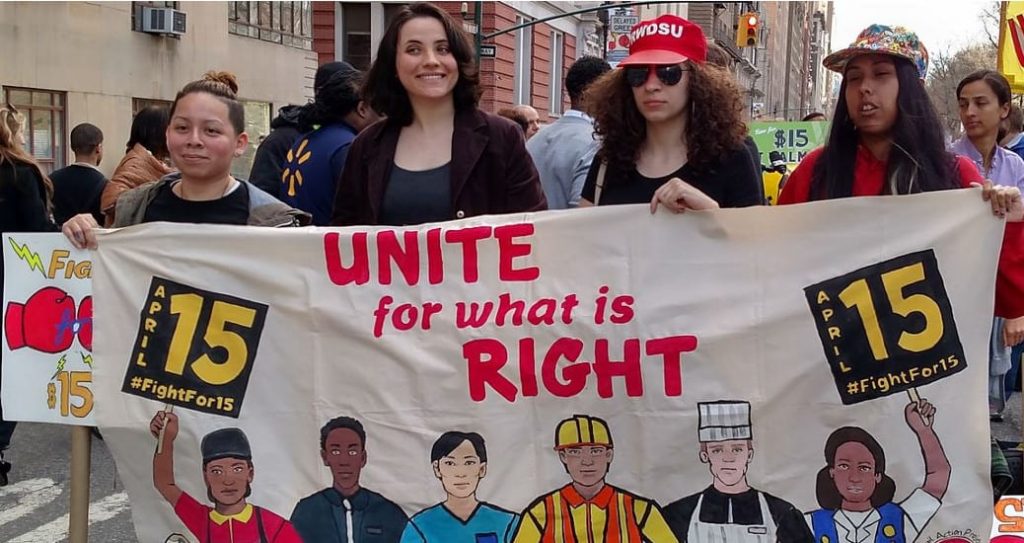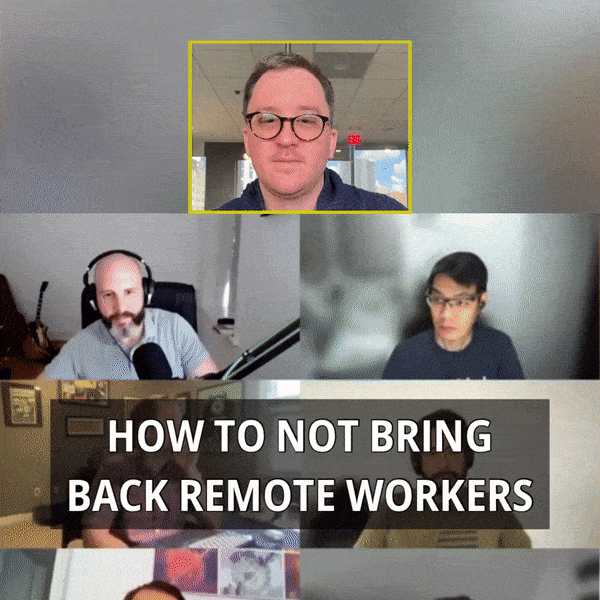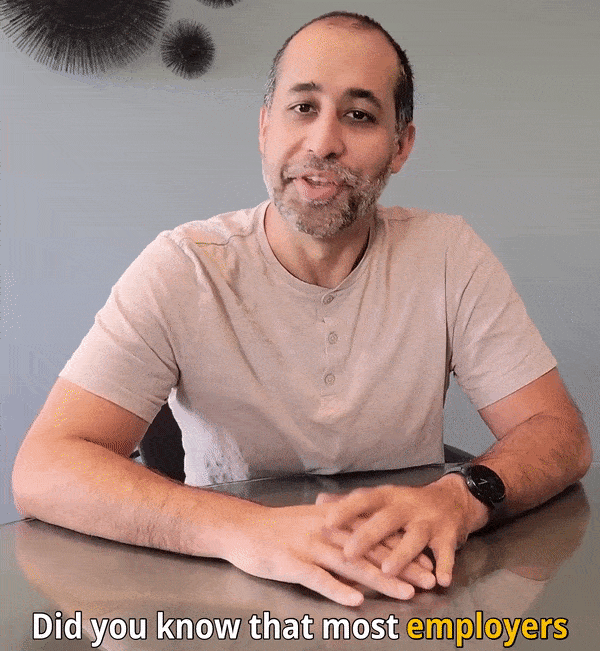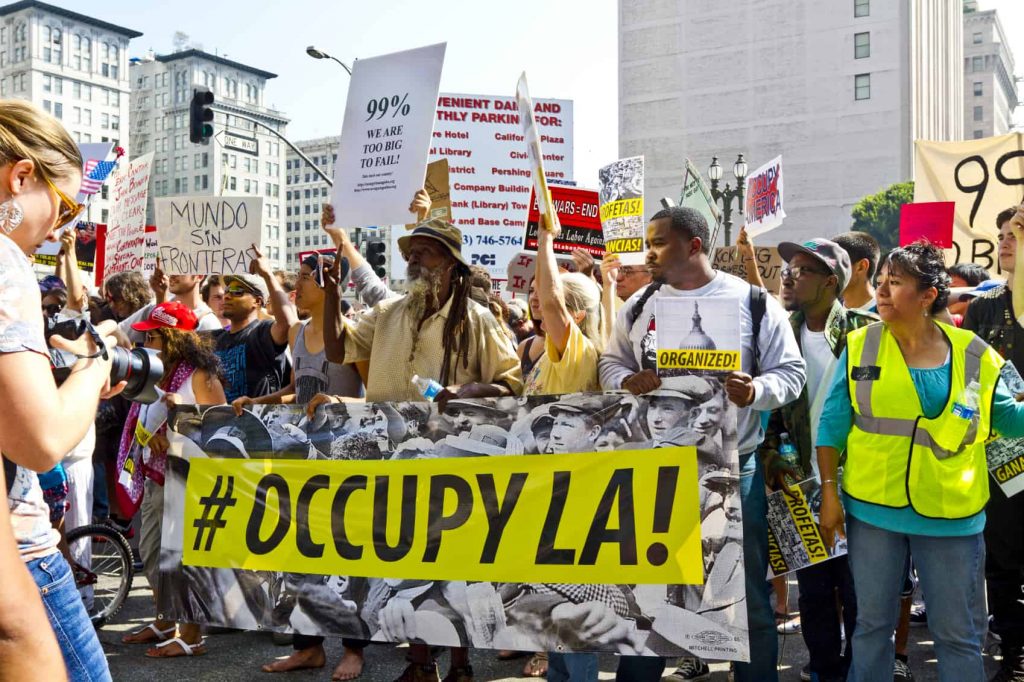The politics of minimum wage laws have been very much in the news lately, because, frankly, there has been a lot of news to report, even aside from the calls from the Democratic presidential candidates to increase the minimum wage. It used to be the case that the minimum wage was largely a matter of one central figure: the federal minimum wage. While states and municipalities have always been free to offer a higher minimum wage, they could not mandate an effective lower minimum wage. But, by and large, states did not deviate much from the federal minimum wage: see this chart of California’s minimum wage over the past century, and you’ll see that, up until the last two years, it has not differed that much from the federal minimum wage over the same period, represented in this chart.
But, as of 2016, California’s minimum wage is $10 an hour, or around 38% above the federal minimum wage of $7.25, with that rate to rise another 50% to $15 by 2022. Numerous other states hover around the $10 mark as well, with Massachusetts set to go to $11 next year, and the District of Columbia already at $11.50. Meanwhile, major US cities are even further ahead, with New York City, Los Angeles, San Francisco, and Seattle set to see their minimum wage rise to $15 over the next few years.
So, while the U.S. Congress doesn’t appear poised to raise the federal minimum wage anytime soon (although that could easily change with the election of a Democratic president and legislature), that figure is less and less important for workers in some of the most populous cities and states in the country, and employers doing business in those regions obviously must comply with the higher wage restrictions.
No doubt you’ve heard the political and economic arguments for and against raising the minimum wage. On the for side, economists argue that putting more money in the pockets of low-income workers and families increases the amount of spending money out there needed to stimulate our economy on a widespread basis, and takes the burden off taxpayer-funded social services when wages don’t match up with the base cost of living. On the against side, a high minimum wage hits small businesses the hardest, who may not have the resources to hire additional workers that bigger companies do, and might simply not be able to hire workers at all, pushing more workers into unemployment, which is obviously worse for all parties than a lower minimum wage.
Those are, of course, the political arguments. But is there an argument that states and localities who raise their minimum wage far above the federal minimum wage are violating the US constitution? That’s the basis for a number of court challenges to these new laws, but is there any merit to them?
The Franchisors v. Seattle
After Seattle raised its minimum wage to $15 an hour, the International Franchise Association (“IFA”) sued the city in 2014, seeking a preliminary injunction to prevent it from enforcing the new law. The IFA, which represents owners of franchise operations such as McDonalds and Two Men and a Truck, argued that “the Seattle law was unfair, discriminatory and was a deliberate attempt to achieve a political agenda at the expense of local, small-business franchise owners,” and pledged to take its fight all the way to the Supreme Court if necessary.
The IFA, led in its legal battle by former Solicitor General Paul Clement (who, for what it’s worth, charges his clients $1350 a hour – 90 times the $15/hour minimum wage in Seattle), did just that, taking the IFA’s case through the 9th Circuit (where the IFA lost) and on up to the Supreme Court. The Supreme Court just this week, however, denied, the IFA’s petition for review, meaning the 9th Circuit has the final word on the constitutionality of the minimum wage hike, at least as applied to the IFA.
The IFA’s Constitutional Arguments Against $15
The IFA certainly took a comprhensive approach in attacking Seattle’s minimum wage, arguing that it violated the Constitution’s commerce clause provision, equal protection clause, and the First Amendment. The 9th Circuit obviously shut down these arguments, but its worth taking note of them, given that circuit splits (differences in the way circuit courts rule on the same issue) occur all the time, and a different circuit court might take a more favorable view on these arguments as applied to another plaintiff or minimum wage law.
The Dormant Commerce Clause
The commerce clause rarely gets the media buzz that its sibling constitutional provisions such as the equal protection clause and the implicit right to privacy get – and its twin principle, the dormant commerce clause gets even less attention – but the commerce clause and dormant commerce clause are the basis for much of our constitutional jurisprudence related to economic activity.
Essentially, the commerce clause gives the federal congress the power to regulate interstate commerce. The principle of the dormant commerce clause then says that states and localities may not discriminate against out-of-state businesses by enforcing restrictions which unfairly favor in-state businesses.
The IFA argued that by applying Seattle’s minimum wage law to small, individual businesses that were franchises of much bigger national corporations (e.g. Burger King), the law unfairly discriminated against them in favor of local non-franchise small businesses who did not have to comply with the wage hike for several years.
In attempting to establish a discriminatory motive on the part of the city against out-of-state businesses, the IFA pointed to tweets and emails made by officials and committee members, i.e. a statement by one committee member that, “[N]ational franchises like McDonalds, or Burger King or KFC, or Subway, simply are not that beneficial to our city. First, these organizations are consistently at the low end of the scale in term…”
The 9th Circuit rejected the IFA’s arguments that the minimum wage hike improperly discriminated against out-of-state businesses, finding there was no sufficient evidence of a biased motive against those businesses in passing the law.
The Equal Protection Clause
The Fourteenth Amendment’s equal protection clause which guarantees different classifications of people equal protections under the law has been the basis for historic Supreme Court victories for desegregating schools, extending equal rights protection, and outlawing restrictions on gay rights. It has less often been invoked in the economic context, but the IFA argued that the minimum wage hike violated the equal protection clause by treating small franchises differently from local, non-franchise small businesses.
The key thing to understand about the equal protection clause is that, while the courts will take a very strict view of different treatment under the law based upon suspect classifications such as race or religion, when it comes to economic classifications, a court will only require a “rational” reason for the different treatment. The 9th Circuit agreed with the district court here that it was rational for Seattle to treat small, locally owned businesses differently from national franchises, as the locally-owned would likely have less of an ability than the franchise businesses to pay the higher wages.
The First Amendment
Like the equal protection clause, the First Amendment is not typically associated with wage laws, but the IFA made the argument that its members’ First Amendment freedom to operate under a marketing plan prescribed by a franchisor was violated by the wage hike. The 9th Circuit made quick work of this argument, holding that the hike will not affect First Amendment freedoms as, “It is clear that the ordinance was not motivated by a desire to suppress speech, the conduct at issue is not franchisee expression, and the ordinance does not have the effect of targeting expressive activity.”
Challenges to Minimum Wage Hikes in Other Jurisdictions
Seattle is not the only jurisdiction that has been taken to court over its minimum wage laws. A fast food industry group called the National Restaurant Association filed suit against New York’s planned wage hikes, and the group was joined by the IFA as well as the National Federation for Independent Business.
A Department of Labor Appeals Board in New York previously upheld the wage increase in an appeal made by fast food franchisees. As an administrative decision, this ruling could be overruled by a state or federal court ruling on the matter, but given the decision in the 9th Circuit, this appears somewhat unlikely.
Can States Prevent Cities From Raising Their Minimum Wage?
Some state legislatures and governors have felt that cities should not be able to unilaterally raise the minimum wage in their own city limits and have passed laws preventing cities from doing so. Arizona was one of the first states to do this when it passed legislation preventing Flagstaff and other cities from setting their own wage standards, a law that the Arizona Attorney General later found to be in violation of the state’s consitution. In his 2016 state of the state address, however, Arizona Gov. Doug Ducey pledged to withhold all state funding from any municipalities that instituted minimum wage increases.
North Carolina’s legislature also moved recently to prevent Charlotte from raising its minimum wage, which was part of the controversial “bathroom bill” also directed at Charlotte’s attempts to institute transgender rights. All in all, 19 state legislatures have acted to prevent cities from raising their minimum wages, and commentators – noting that many of the laws have similar language – indicate that the state laws have been promoted by the American Legislative Exchange Council, a conservative non-profit group, suggesting we may continue to see more states pass such laws.
As state governments largely work independently of the federal government with regard to purely internal economic matters, there is little to suggest that such laws are violative of federal constitutional protections, so long as no provisions supersede federal law. But such laws may be violative of individual state’s laws and/or constitutions, as was the case in Arizona.
With the Supreme Court’s lack of interest in hearing the IFA’s constitutional challenge to the wage hikes, and the 9th Circuit’s decision, state legislature action to limit wage hikes may be likely be where minimum wage hike fights are fought in the future.


![California v. Texas: Which is Better for Business? [313]](https://www.pashalaw.com/wp-content/uploads/2021/07/Pasha_LSSB_CaliforniaVSTexas-1024x723.jpg)



![Employers vs. Employees: When Are Employment Restrictions Fair? [e318]](https://www.pashalaw.com/wp-content/uploads/2022/05/Pasha_LSSB_EmployeesVsEmployers_banner-1-1024x723.jpg)

![Business of Healthcare [e316]](https://www.pashalaw.com/wp-content/uploads/2021/11/Pasha_LSSB_BusinessofHealthcare_banner-1024x723.jpg)







![Law in the Digital Age: Exploring the Legal Intricacies of Artificial Intelligence [e323]](https://www.pashalaw.com/wp-content/uploads/2023/11/WhatsApp-Image-2023-11-21-at-13.24.49_4a326c9e-300x212.jpg)
![Unraveling the Workforce: Navigating the Aftermath of Mass Layoffs [e322]](https://www.pashalaw.com/wp-content/uploads/2023/07/Untitled-design-23-300x212.png)
![Return to the Office vs. Remote: What Can Employers Legally Enforce? [e321]](https://www.pashalaw.com/wp-content/uploads/2023/01/Pasha_LSSB_321_banner-300x212.jpg)
![Explaining the Hans Niemann Chess Lawsuit v. Magnus Carlsen [e320]](https://www.pashalaw.com/wp-content/uploads/2022/10/LAWYER-EXPLAINS-7-300x169.png)
![California v. Texas: Which is Better for Business? [313]](https://www.pashalaw.com/wp-content/uploads/2021/07/Pasha_LSSB_CaliforniaVSTexas-300x212.jpg)
![Buyers vs. Sellers: Negotiating Mergers & Acquisitions [e319]](https://www.pashalaw.com/wp-content/uploads/2022/06/Pasha_LSSB_BuyersVsSellers_banner-300x212.jpg)
![Employers vs. Employees: When Are Employment Restrictions Fair? [e318]](https://www.pashalaw.com/wp-content/uploads/2022/05/Pasha_LSSB_EmployeesVsEmployers_banner-1-300x212.jpg)
![Vaccine Mandates Supreme Court Rulings [E317]](https://www.pashalaw.com/wp-content/uploads/2022/02/WhatsApp-Image-2022-02-11-at-4.10.32-PM-300x212.jpeg)
![Business of Healthcare [e316]](https://www.pashalaw.com/wp-content/uploads/2021/11/Pasha_LSSB_BusinessofHealthcare_banner-300x212.jpg)
![Social Media and the Law [e315]](https://www.pashalaw.com/wp-content/uploads/2021/10/WhatsApp-Image-2021-10-06-at-1.43.08-PM-300x212.jpeg)
![Defining NDA Boundaries: When does it go too far? [e314]](https://www.pashalaw.com/wp-content/uploads/2021/09/Pasha_LSSB_NDA_WordPress-2-300x212.jpg)
![More Than a Mistake: Business Blunders to Avoid [312] Top Five Business Blunders](https://www.pashalaw.com/wp-content/uploads/2021/06/Pasha_LSSB_Blunders_WP-1-300x212.jpg)
![Is There a Right Way to Fire an Employee? We Ask the Experts [311]](https://www.pashalaw.com/wp-content/uploads/2021/02/Pasha_LSSB_FireAnEmployee_Website-300x200.jpg)
![The New Frontier: Navigating Business Law During a Pandemic [310]](https://www.pashalaw.com/wp-content/uploads/2020/12/Pasha_LSSB_Epidsode308_Covid_Web-1-300x200.jpg)
![Wrap Up | Behind the Buy [8/8] [309]](https://www.pashalaw.com/wp-content/uploads/2020/11/Pasha_BehindTheBuy_Episode8-300x200.jpg)
![Is it all over? | Behind the Buy [7/8] [308]](https://www.pashalaw.com/wp-content/uploads/2020/09/iStock-1153248856-overlay-scaled-300x200.jpg)
![Fight for Your [Trademark] Rights | Behind the Buy [6/8] [307]](https://www.pashalaw.com/wp-content/uploads/2020/07/Fight-for-your-trademark-right-300x200.jpg)
![They Let It Slip | Behind the Buy [5/8] [306]](https://www.pashalaw.com/wp-content/uploads/2020/06/Behind-the-buy-they-let-it-slip-300x200.jpg)
![Mo’ Investigation Mo’ Problems | Behind the Buy [4/8] [305]](https://www.pashalaw.com/wp-content/uploads/2020/05/interrobang-1-scaled-300x200.jpg)
![Broker or Joker | Behind the Buy [3/8] [304] Behind the buy - Broker or Joker](https://www.pashalaw.com/wp-content/uploads/2020/04/Joker-or-Broker-1-300x185.jpg)
![Intentions Are Nothing Without a Signature | Behind the Buy [2/8] [303]](https://www.pashalaw.com/wp-content/uploads/2020/04/intentions-are-nothing-without-a-signature-300x185.jpg)
![From First Steps to Final Signatures | Behind the Buy [1/8] [302]](https://www.pashalaw.com/wp-content/uploads/2020/04/first-steps-to-final-signatures-300x185.jpg)
![The Dark-side of GrubHub’s (and others’) Relationship with Restaurants [e301]](https://www.pashalaw.com/wp-content/uploads/2015/04/When-Competition-Goes-Too-Far-Ice-Cream-Truck-Edition-300x201.jpg)
![Ultimate Legal Breakdown of Internet Law & the Subscription Business Model [e300]](https://www.pashalaw.com/wp-content/uploads/2019/05/Ultimate-Legal-Breakdown-of-Internet-Law-the-Subscription-Business-Model-300x196.jpg)
![Why the Business Buying Process is Like a Wedding?: A Legal Guide [e299]](https://www.pashalaw.com/wp-content/uploads/2019/03/futura-300x169.jpg)
![Will Crowdfunding and General Solicitation Change How Companies Raise Capital? [e298]](https://www.pashalaw.com/wp-content/uploads/2018/11/Will-Crowdfunding-and-General-Solicitation-Change-How-Companies-Raise-Capital-300x159.jpg)
![Pirates, Pilots, and Passwords: Flight Sim Labs Navigates Legal Issues (w/ Marc Hoag as Guest) [e297]](https://www.pashalaw.com/wp-content/uploads/2018/07/flight-sim-labs-300x159.jpg)
![Facebook, Zuckerberg, and the Data Privacy Dilemma [e296] User data, data breach photo by Pete Souza)](https://www.pashalaw.com/wp-content/uploads/2018/04/data-300x159.jpg)
![What To Do When Your Business Is Raided By ICE [e295] I.C.E Raids business](https://www.pashalaw.com/wp-content/uploads/2018/02/ice-cover-300x159.jpg)
![General Contractors & Subcontractors in California – What you need to know [e294]](https://www.pashalaw.com/wp-content/uploads/2018/01/iStock-666960952-300x200.jpg)
![Mattress Giants v. Sleepoplis: The War On Getting You To Bed [e293]](https://www.pashalaw.com/wp-content/uploads/2017/12/sleepopolis-300x159.jpg)
![The Harassment Watershed [e292]](https://www.pashalaw.com/wp-content/uploads/2017/12/me-2-300x219.jpg)
![Investing and Immigrating to the United States: The EB-5 Green Card [e291]](https://www.pashalaw.com/wp-content/uploads/2012/12/eb-5-investment-visa-program-300x159.jpg)
![Responding to a Government Requests (Inquiries, Warrants, etc.) [e290] How to respond to government requests, inquiries, warrants and investigation](https://www.pashalaw.com/wp-content/uploads/2017/10/iStock_57303576_LARGE-300x200.jpg)
![Ultimate Legal Breakdown: Employee Dress Codes [e289]](https://www.pashalaw.com/wp-content/uploads/2017/08/Ultimate-Legal-Breakdown-Template-1-300x159.jpg)
![Ultimate Legal Breakdown: Negative Online Reviews [e288]](https://www.pashalaw.com/wp-content/uploads/2017/06/Ultimate-Legal-Breakdown-Online-Reviews-1-300x159.jpg)
![Ultimate Legal Breakdown: Social Media Marketing [e287]](https://www.pashalaw.com/wp-content/uploads/2017/06/ultimate-legal-breakdown-social-media-marketing-blur-300x159.jpg)
![Ultimate Legal Breakdown: Subscription Box Businesses [e286]](https://www.pashalaw.com/wp-content/uploads/2017/03/ultimate-legal-breakdown-subscription-box-services-pasha-law-2-300x159.jpg)
![Can Companies Protect Against Foreseeable Misuse of Apps [e285]](https://www.pashalaw.com/wp-content/uploads/2017/01/iStock-505291242-300x176.jpg)
![When Using Celebrity Deaths for Brand Promotion Crosses the Line [e284]](https://www.pashalaw.com/wp-content/uploads/2017/01/celbrity-300x159.png)
![Are Employers Liable When Employees Are Accused of Racism? [e283] Racist Employee](https://www.pashalaw.com/wp-content/uploads/2016/12/Are-employers-liable-when-an-employees-are-accused-of-racism-300x159.jpg)
![How Businesses Should Handle Unpaid Bills from Clients [e282] What to do when a client won't pay.](https://www.pashalaw.com/wp-content/uploads/2016/12/How-Businesses-Should-Handle-Unpaid-Bills-to-Clients-300x159.png)
![Can Employers Implement English Only Policies Without Discriminating? [e281]](https://www.pashalaw.com/wp-content/uploads/2016/11/Can-Employers-Impliment-English-Only-Policies-Without-Discriminating-300x159.jpg)
![Why You May No Longer See Actors’ Ages on Their IMDB Page [e280]](https://www.pashalaw.com/wp-content/uploads/2016/10/IMDB-AGE2-300x159.jpg)
![Airbnb’s Discrimination Problem and How Businesses Can Relate [e279]](https://www.pashalaw.com/wp-content/uploads/2016/09/airbnb-300x159.jpg)
![What To Do When Your Amazon Account Gets Suspended [e278]](https://www.pashalaw.com/wp-content/uploads/2016/09/What-To-Do-When-Your-Amazon-Account-Gets-Suspended-1-300x200.jpg)
![How Independent Artists Reacted to Fashion Mogul Zara’s Alleged Infringement [e277]](https://www.pashalaw.com/wp-content/uploads/2016/08/How-Independent-Artists-Reacted-to-Fashion-Mogul-Zaras-Alleged-Infringement--300x159.jpg)
![Can Brave’s Ad Replacing Software Defeat Newspapers and Copyright Law? [e276]](https://www.pashalaw.com/wp-content/uploads/2016/08/Can-Braves-Ad-Replacing-Software-Defeat-Newspapers-and-Copyright-Law-300x159.jpg)
![Why The Roger Ailes Sexual Harassment Lawsuit Is Far From Normal [e275]](https://www.pashalaw.com/wp-content/uploads/2016/07/WHY-THE-ROGER-AILES-SEXUAL-HARASSMENT-LAWSUIT-IS-FAR-FROM-NORMAL-300x159.jpeg)
![How Starbucks Turned Coveted Employer to Employee Complaints [e274]](https://www.pashalaw.com/wp-content/uploads/2016/07/iStock_54169990_LARGE-300x210.jpg)
